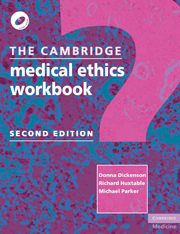Book contents
- Frontmatter
- Contents
- List of cases
- List of papers
- Preface to the second edition
- Preface to the first edition
- Cases in medical ethics and law: an interactive tutorial
- 1 Death and dying: decisions at the end of life
- 2 Reproduction: decisions at the start of life
- 3 Genetics: information, access and ownership
- 4 Medical research: participation and protection
- 5 Mental health: consent, competence and caring
- 6 Long-term care: autonomy, ageing and dependence
- 7 Children and young people: conflicting responsibilities
- 8 Resource allocation: justice, markets and rationing
- 9 Thinking about ethics: autonomy and patient choice
- Appendix 1 Study guide for teachers
- Appendix 2 Using keywords to explore this book
- Bibliography
- Index
5 - Mental health: consent, competence and caring
- Frontmatter
- Contents
- List of cases
- List of papers
- Preface to the second edition
- Preface to the first edition
- Cases in medical ethics and law: an interactive tutorial
- 1 Death and dying: decisions at the end of life
- 2 Reproduction: decisions at the start of life
- 3 Genetics: information, access and ownership
- 4 Medical research: participation and protection
- 5 Mental health: consent, competence and caring
- 6 Long-term care: autonomy, ageing and dependence
- 7 Children and young people: conflicting responsibilities
- 8 Resource allocation: justice, markets and rationing
- 9 Thinking about ethics: autonomy and patient choice
- Appendix 1 Study guide for teachers
- Appendix 2 Using keywords to explore this book
- Bibliography
- Index
Summary
We begin this chapter with the case of Mr AB from Italy, because it raises not only important ethical issues in itself, but also ethical questions about mental health more widely. Are there morally significant differences between psychiatric medicine and medicine of other kinds? Are there also morally significant differences between various psychiatric conditions? If so, what are the implications of these differences for the practice of psychiatric medicine?
Central to Mr AB's case are questions about autonomy and mental competence, which we will further explore by returning to the case of Mr C, whom we encountered in the first chapter, on decisions at the end of life. The autonomy of the psychiatric patient is a core theme in the ethics of mental health care. As such, in the second section of this chapter, we move to examine ideas associated with autonomy, like the freedom or liberty of a psychiatric patient and the limits (if any) that can be placed on his or her freedom (such as through involuntary treatment or hospitalization). The boundaries of autonomy also feature in the third section, which focuses upon the mental health of children and young people. In that section, as in the previous one, we will explore the tensions that can arise between protecting the patient's autonomy and protecting their welfare. You will see, at many points, that there appears to be conflict between an approach premised on patients' rights and more paternalistic approaches to psychiatric treatment and care.
- Type
- Chapter
- Information
- The Cambridge Medical Ethics Workbook , pp. 101 - 124Publisher: Cambridge University PressPrint publication year: 2010



